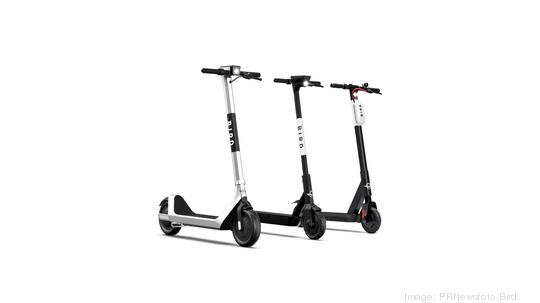
A permanent e-scooter presence in Chicago is getting closer to reality.
The Chicago Department of Transportation (CDOT) released a report on Friday showing that during last year’s e-scooter pilot, the devices were useful in helping Chicagoans get around and that requiring idle scooters be locked to something helped minimize sidewalk clutter complaints.
Based on the encouraging findings from last year's pilot, CDOT said it is set to meet with City Council to discuss a path forward for e-scooters in Chicago.
“The city is committed to providing equitable, accessible, affordable, and sustainable transportation options for all of our residents and visitors,” said CDOT Commissioner Gia Biagi in a statement. “CDOT looks forward to working with City Council to craft programs that can provide mobility benefits throughout the city in a responsible and manageable way.”
E-scooters first landed in Chicago in 2019 during a pilot program that ran for about four months. Initial feedback included complaints about scooters cluttering sidewalks and roads. When the city launched the second pilot in 2020, CDOT enforced a new rule that required each scooter be equipped with a lock so they could be easily attached to bike racks, street signs and other fixed objects.
City data showed a 75% decrease in complaints-per-day-per-device during the 2020 pilot compared to the 2019 pilot.
In the 2020 program, which ran from Aug. 12 to Dec. 12, three e-scooter vendors were available to riders, including Bird, Lime and Spin. It is unclear if these same companies would be chosen in a permanent program.
During the pilot, the only parts of the city where scooters were not allowed to operate were the lakefront, the 606 trail, O'Hare Airport and the central business district. The restrictions were enforced with geofencing technology. CDOT also required scooter companies to place 50% of all e-scooters in equity priority areas across the south and west sides.
Data shows that the average trip distance was 2.1 miles and average trip duration was 18.5 minutes.
A survey administered to Chicagoans by CDOT showed that riders and non-riders have significantly different views on e-scooters. About 88% of e-scooter riders said they think scooters should be a part of Chicago’s transportation system, while 65% of non-riders believe they should not be a transportation option in Chicago.
“The two e-scooter pilot programs show there is a demand throughout Chicago for new transportation options,” said Alderman Howard B. Brookins (21), chair of the Transportation and Public Way Committee, in a statement. “However, we have also learned, that any authorization of e-scooters needs to be through an accountable and well-managed program that ensures that they benefit all Chicagoans."






